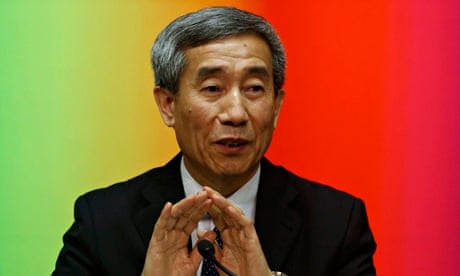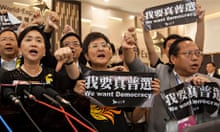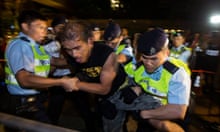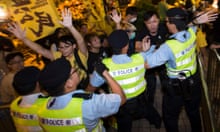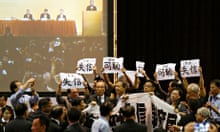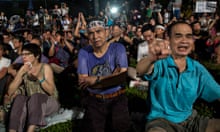Hong Kong voters would be "confused" if they had too many candidates to choose from, a Beijing official told a briefing in the city on Monday, as pro-democracy activists launched their civil disobedience campaign against the decision to tightly limit electoral reforms.
While China has promised to introduce universal suffrage for elections of the next chief executive in 2017, the rigid framework announced on Sunday requires the screening of candidates and effectively ensures pro-democracy politicians cannot stand. Pan-democrat lawmakers in Hong Kong have vowed to vote down the plans.
Some were escorted from the speech by Li Fei, deputy secretary general of the standing committee of the National People's Congress, after they and other demonstrators chanted slogans and held up placards reading "shameful" and accusing China of breaking its promise to introduce democratic freedoms. Police used pepper spray to stop a separate group of activists from storming the venue.
The Occupy Central with Peace and Love movement has said it will take over the financial heart of Hong Kong at an unspecified date, in the culmination of a non-violent civil disobedience campaign.
Several vehicles, some decorated with flags, launched a "slow drive" through the city on Monday. They were accompanied by police vehicles, but traffic was not noticeably disrupted. Activists also say students from 11 schools have committed to boycotting classes from mid-September.
Li Fei warned his audience: "Occupy Central is an illegal activity. If we give in, it will trigger more illegal activities."
The South China Morning Post reported that he said voters would be "confused" by more than two or three candidates, adding: "People may not know what they advocate and what they have achieved before."
Limiting the numbers would "guarantee genuine choice for voters" while preventing the election from becoming "too complicated and costly", Li said.
If the plans fall in Hong Kong's legislative council, the current system will continue, with a committee of mostly pro-Beijing loyalists selecting the next leader.
Britain showed little interest in democratic reforms until the dying days of colonial rule. But Hong Kong was handed back to China under a "one country, two systems" agreement that gave it freedoms not enjoyed on the mainland, such as free speech and the right to protest.
On the mainland, the state-run Global Times newspaper wrote that "the radical opposition camp is doomed to be a paper tiger", quoting a phrase most associated with Mao Zedong.
China Daily, an English language state newspaper, added that the people of Hong Kong had to choose whether "to embrace a hitherto unprecedented level of democracy, or the disruptive, reckless political gamble to be staged by the radicals".
While no one anticipated that Beijing would allow open nominations, the decision passed by the standing committee of the National People's Congress is particularly tough. It states that only two to three candidates are permitted and that each must win the backing of at least half of the nominating committee, which will be composed overwhelmingly of Beijing loyalists.
"I think that part of making this very uncompromising proposal is letting it be vetoed by the democrats and then blaming them for holding back reforms," said Ho-fung Hung of Johns Hopkins University, who has written on relations between the special administrative region and the mainland.
But he suggested that China might issue reform proposals in future.
"I think the best thing for Beijing is really to set up a fake democratic system endorsed by the legislature of Hong Kong so that they can say, 'We have fulfilled the basic promises under the Sino-British declaration and Basic Law. The deal is done and you foreign countries don't have anything to do with Hong Kong any more.' … It will close that space for criticism from the opposition in Hong Kong and the international community," he said.
Hung added that the pan-democrat proportion of the overall vote was gradually slipping, suggesting that migration from the mainland and sustained efforts to integrate those migrants into the pro-establishment camp were having an impact. At the same time, pro-democracy voters were being radicalised and were more likely to see themselves as having a Hong Kong rather than Chinese identity.
The Mainland Affairs Council in Taiwan, which has de facto independence, expressed "regret" at the NPC's decision.
The opposition Democratic Progressive party said that deciding to limit the type and number of candidates for Hong Kong's election was a huge setback for the progress of Hong Kong's democracy.
